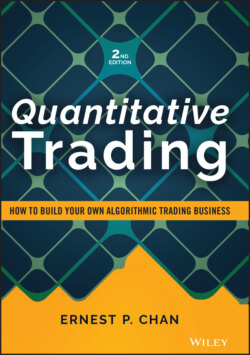Читать книгу Quantitative Trading - Ernest P. Chan - Страница 27
Does the Data Suffer from Survivorship Bias?
ОглавлениеA historical database of stock prices that does not include stocks that have disappeared due to bankruptcies, delistings, mergers, or acquisitions suffer from survivorship bias, because only “survivors” of those often unpleasant events remain in the database. (The same term can be applied to mutual fund or hedge fund databases that do not include funds that went out of business.) Backtesting a strategy using data with survivorship bias can be dangerous because it may inflate the historical performance of the strategy. This is especially true if the strategy has a “value” bent; that is, it tends to buy stocks that are cheap. Some stocks were cheap because the companies were going bankrupt shortly. So if your strategy includes only those cases when the stocks were very cheap but eventually survived (and maybe prospered) and neglects those cases where the stocks finally did get delisted, the backtest performance will, of course, be much better than what a trader would actually have suffered at that time.
So when you read about a “buy on the cheap” strategy that has great performance, ask the author of that strategy whether it was tested on survivorship bias–free (sometimes called “point-in-time”) data. If not, be skeptical of its results. (A toy strategy that illustrates this can be found in Example 3.3.)
